By Rowan Salim
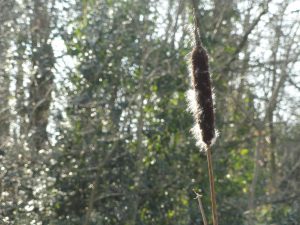
Last term (spring term) we started a science club. This came about when a visiting parent suggested it in the meeting, the children cheered, and there it was, up and running. Friday afternoons, dedicated to science. It would be fun, it would be experiment based, the children could propose experiments or themes they wanted to explore, and no one would be forced to take part. We started by doing lava lamps and gigantic bubbles. Both afternoons were fun and the children’s understanding of the properties of materials was probably enhanced.
But the parent spotted pretty quickly that while I was supportive of the group’s decision to do this, and I even used my own vote to agree to the proposal, something about it didn’t sit well with me. She messaged me that week asking me openly if I had a concern about it, and I acknowledged that I did, but couldn’t quite work out what it was. I thought initially that it was just a reaction to suddenly having a fixed item in our free schedule. But there was more to it than that. So I spent the following few weeks thinking about this on my bike, and I’m using this column to explore these ideas. Please note that this blog post is exploratory!
Idea 1: Science is everywhere
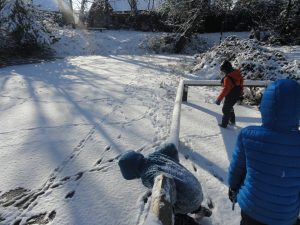
The first conclusion I reached is that science is everywhere. Experiments are everywhere, and the fun of learning from them happens all the time at Dacres Wood. The day after my call with the parent, the pond was frozen over and I spent a morning with 4 of the children experimenting with cracking the ice, watching air bubbles get trapped underneath it, working out how much force we need to smash it with a stick, talking about pond life and how the ice might affect it,
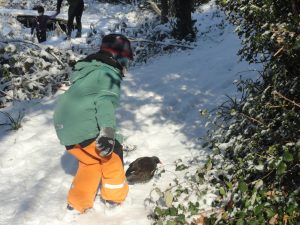
watching the space which the resident Moorhens have to navigate around the pond shrink down. This was science, but we didn’t call it that.
Every day we “do science”. We do science when we build dens out of sticks or out of bricks, working out angles, pressure points, balancing, learning, leveraging.
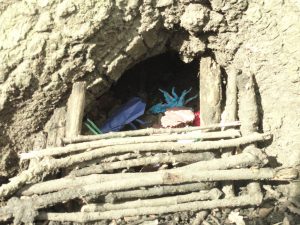
We do science when we climb trees. We do science when we make paper airplanes and through trial and error work out which models fly best and which folding techniques are most accurate. We do science when we mix colors; we do science when we make lemonade, add a little sugar, add more lemon juice, taste, more sugar, stir, taste, more lemon juice, taste, dip a banana into it, bingo!
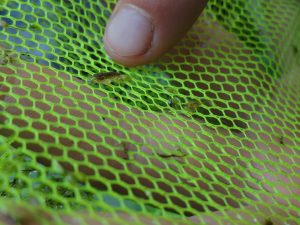
Science is the process of understanding the world around us, through observation and experimentation, and that is something we do every day at Dacres’ Wood and within different spheres of play. The fact that we don’t call it science doesn’t mean that it is not. And the fact that the science club suddenly existed didn’t make what was happening there more “science” than anything else – apart from the fact that we’re naming it.
Idea 2: Naming it
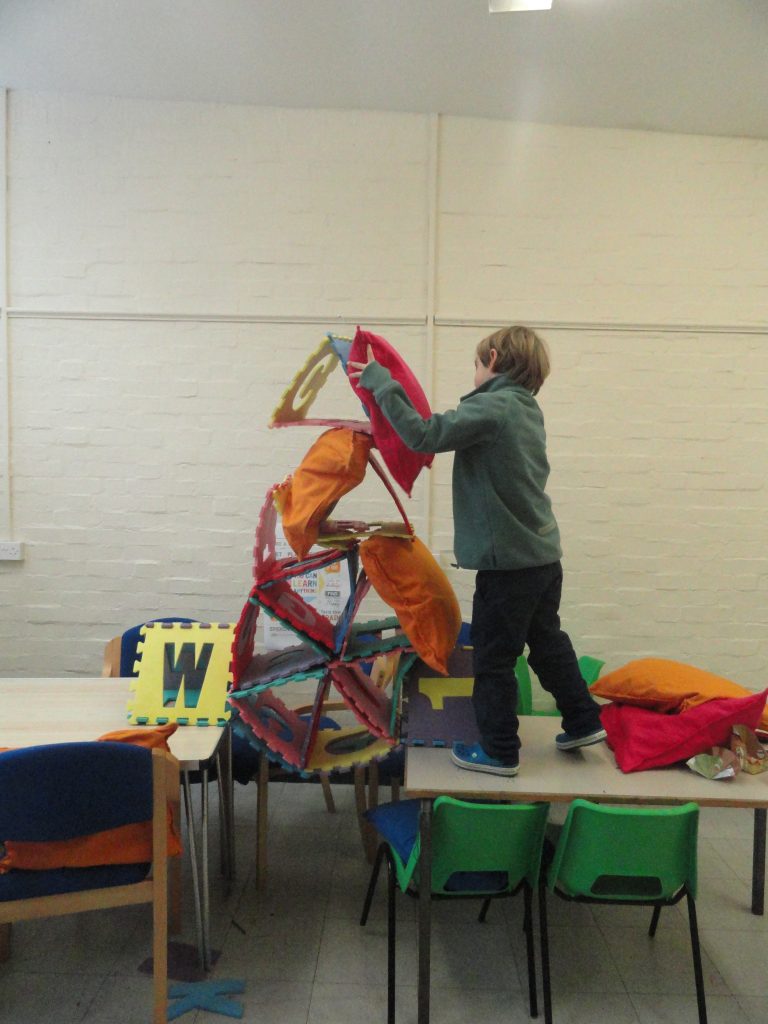
Is there a benefit to intentionality? Maybe we want to teach children about the rigors of the scientific method. We make observations, we form questions, we formulate a hypothesis, we develop a prediction, we test the prediction, we refine the hypothesis, we retest, we formulate a general theory. Understanding the rigors of this process is important. This is interesting because when I watch children play I see that this method comes naturally. They are constantly living this cycle. Children live this cycle from birth. Toddler drops spoon. Parent picks it up. Toddler drops spoon again. Parent reacts. Toddler drops spoon again. We’ve all lived it.
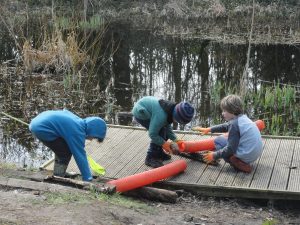
When children continue to be supported in their play and when their processes of enquiry are trusted, where there is room to reach a state of flow in one’s explorations, and when there are supportive adults to help work out answers, share tools and model their own processes of enquiry then there is no reason to think that this may suddenly stop sometime in childhood. As children grow older, these processes and tools can also become enhanced.
Another benefit which the study of science gives us is the language needed to communicate an understanding of the world to others.
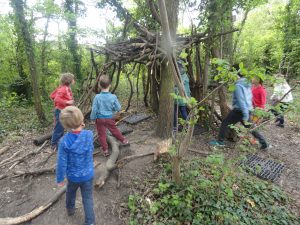
For example, it is one thing to be able to build a den, and it is another to be able to explain to someone else how to do it. But I believe that this is compatible with self-directed play based learning at this age. Last week the children were engaged in a complex game of phantasy play involving various dinosaurs, a saber-toothed tiger, a dragon and a gorilla. Six of the children were running around the forest playing and I was by the pond observing snippets of their interactions. Then two of the boys came up to me very seriously. They had been having a debate which had interrupted their play and needed advice.
“Is a gorilla a grown up monkey?” They asked.
They looked at me very seriously and repeated the question. Well, gorillas and monkeys are primates, but a gorilla is not a grown up monkey, just like a lion is not a grown up cat and a wolf is not a grown up dog. And soon we got started towards defining a species. Later we pulled out our big Animals book and spent part of the afternoon looking at different families of animals and the species within them. This of course led to a second round of fantasy play, this time with Jaguars, Panthers and Leopards. The fact that Panthers are Leopards which carry a dominant allele causing melanism or that jaguars are stockier and more muscly than leopards is fodder for the next round of fantasy play, until the next question comes up.
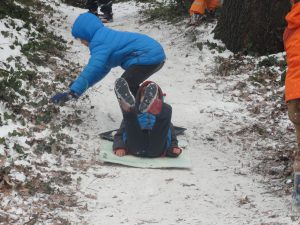
So what happens when we define a specific type of activity and way of doing it with science? For example, if our Friday afternoon experiments are defined as science but playing with the ice on the pond or exploring the taxonomy of different species via fantasy play is not, then a child who does not like organised group activities may decide they don’t like science. Science risks becoming something you do during an allotted hour rather than a way of thinking and exploring the world which you engage with as a matter of course.
Idea 3: Ed positivity
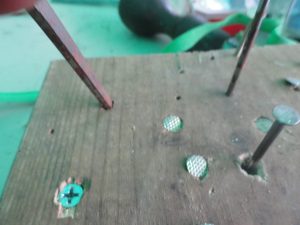
Perhaps we want a science club to give science value. Are we saying that being a scientist is a good thing? Is it better than being a chef, or a musician, or a builder, or a linguist? Does the fact that science has an afternoon to itself while art or fantasy play doesn’t send a message that science is more important? Could this be because despite everything, we’ve got our eyes set on careers already?
Ed positivity is a term Sophie Christophy uses in her work to refer to the interconnectedness of knowledge and the acknowledgement that interest based learning, regardless of where it falls in the landscape of subject silos is valid by virtue of it being driven by curiosity. The world is complex and neither our brains nor the world is divided into subjects. Todays’ global problems are also complex and require us to be able to “hop, skip, jump and weave across disciplines”, as well as ask transdisciplinary questions and to contextualize learning, to make sense of problems, and to open up opportunities to develop more holistic solutions. When we avoid whole disciplines because we believe we are not good at them or others are the experts, this limits our ability to see the whole picture; or it renders our problems someone else’s, by virtue of them being ‘good at it’.
The process of categorizing knowledge and forming disciplines may be a natural and for some purposes a useful one, however through the process of enquiry, through trusting children’s natural curiosity and ability to learn, and through access to the tools of the culture, learners should be able to choose when and whether to engage through these disciplines rather than being channeled into them.
So if learning should be curiosity driven and the first step of enquiry is observation, then is the motivation for the science club that we want to widen the possible areas of enquiry that the children are exposed to? The concept behind Free We Grow is rooted in the understanding that the world is a fascinating place and where, to the extent possible, our curiosity stems from being in the world and engaging directly with it. That is the first step – observation. This is facilitated through our four spaces of engagement: the home, visiting, hosting and buzz spaces. So if that’s the case, should we just go out more? Host more? And who decides when this is needed? Is it us or the children?
So where does this leave the science club? Well, I wrote this blog post 2 months ago for our internal newsletter. At the time, I thought that perhaps the best thing is to simply rename the science club the science ‘lab’, acknowledging that the science that happens there is lab science with manufactured experiments, while the science that happens daily remains science. The article also generated some useful internal conversations – like the idea that science is everywhere is a personal belief and that others may apply spiritual or religious explanations. We are also talking about how at some point naming things can help children define their interests better in order to delve deeper.
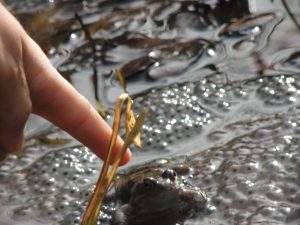
The science lab ran for 3 sessions and then fizzled out. The children enjoyed the sessions, many of them showed up, but they did not request more as they were busy doing other things – many of them very scientific!
Parents and visitors still propose science related activities, or otherwise and these are scheduled in. The children continuously devise their own experiments and request support with more complex explorations which may require additional materials and support. As spring started and the ice on the pond melted, we spent 2 weeks studying the frogspawn and tadpoles, and this happened every day.
Rowan

Comments are closed.